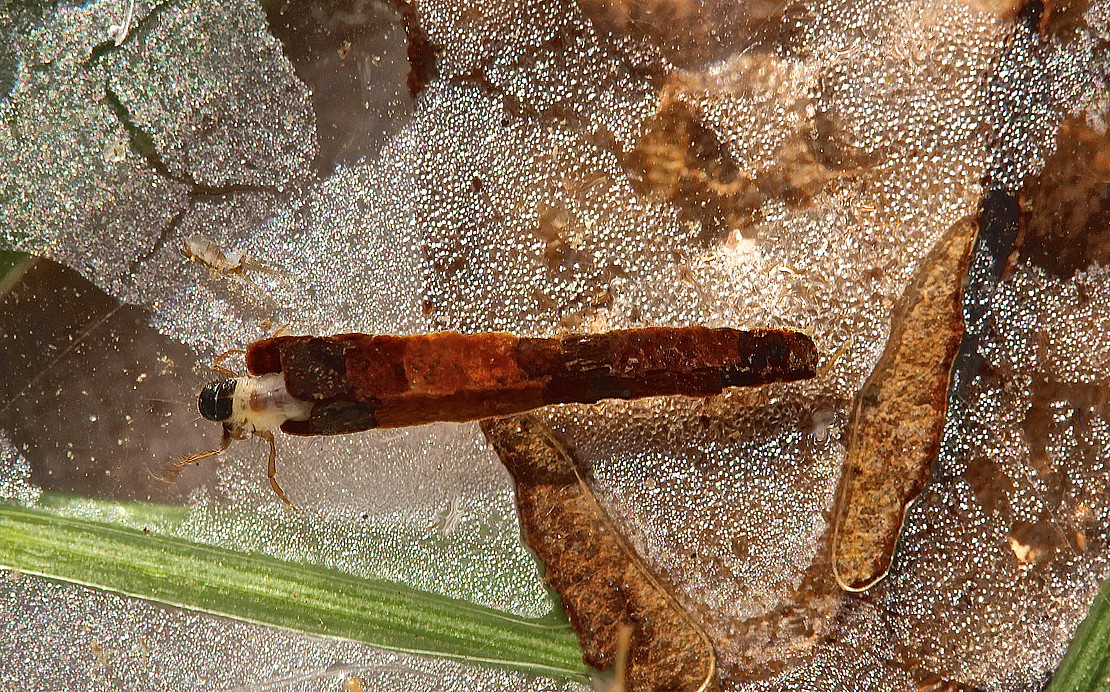This page contains automatically translated content.
Long-term study in Hesse: Drastic decline in aquatic insects
 Image: Bob Henricks.
Image: Bob Henricks.The Breitenbach in the eastern Hessian mountains is one of the best-studied bodies of water in the world: Since 1969, researchers from the Max Planck Society have been analyzing the insect world of the stream, which is located in a nature reserve and thus far away from direct human influence. For decades, Dr. Rüdiger Wagner conducted these studies in an authoritative position, from 2006 to 2010 as Professor of Limnology at the University of Kassel. In 2010, a flood destroyed the last measuring point on the Breitenbach.
About a decade later, scientists from LMU Munich and the Senckenberg Gesellschaft für Naturforschung have now analyzed the data using new methods and approaches. Previously unpublished information was included in the new analyses. They found drastic changes: By more than 80 percent, the number of individuals declined during the study period, they report in the journal Conservation Biology. The researchers attribute this decline to global climate change.
Insects were regularly collected in Breitenbach from January 1969 to December 2010, and environmental factors such as water discharge and temperature were permanently recorded. "Back in the 1990s, we were able to determine and publish that the insect community of Breitenbach was changing over time," Wagner recalls. "Climate change is here. And it shows up not only in the rise in temperature, but in a water body like the Breitenbach, for example, in the seasonal dynamics of the water flow. This, of course, has an impact on the aquatic fauna." This includes typical species such as amphipods and insect larvae.
By no means all the data from the long-term study had been evaluated and published so far. Now LMU zoologist Dr. Viktor Baranov and Professor Peter Haase of the Senckenberg Research Institute and Natural History Museum in Frankfurt, together with other colleagues, have been able to build on this and examine the influence of climate change on the ecosystem of this typical low mountain range stream in more detail.
The results are alarming: since the studies began, the average water temperature of the Breitenbach has risen by 1.8 degrees during the period under investigation, while at the same time the number of insect individuals has decreased by 81.6 percent. "In contrast to this 'loss of abundance,' we are seeing an overall increase in biodiversity in the Breitenbach - so we have fewer individuals, but more species," Haase says. The researchers explain this development with a shift in stream characteristics: "The sampled section was a classic stream headwater 42 years ago. Due to the rise in temperature, it now counts more as a midstream, where you generally find more species," Baranov adds. But the data also show that this trend is reversing - measurements over the past two decades have shown that species diversity in the Breitenbach is declining again. Climate change-related shifts play an important role in this: dry years have dominated since 1990, with corresponding effects on aquatic insects. "As climate change continues, this can be expected to continue," says Baranov.
For Rüdiger Wagner, the long-term study was a life's work. Initially, he worked as a scientific employee of the Max Planck Society, later taking on a leadership role. From 2006, the research at Breitenbach flowed into his work as a professor at the University of Kassel. In 2016, Wagner retired. "It gives me pleasure that our treasure trove of data is now the focus of young scientists," he says. "In many ecological studies, the limited time frame means that the information is limited. Long-term studies like ours that truly deserve the name are few and far between on Earth."
Publication: Baranov, V., Jourdan, J., Pilotto, F., Wagner, R. and Haase, P. (2020), Complex and nonlinear climate-driven changes in freshwater insect communities over 42 years. Conservation Biology. Accepted Author Manuscript. doi:10.1111/cobi.13477
This text uses information from a press release issued by the Senckenberg-Gesellschaft für Naturforschung.
Contact and further information:
Sebastian Mense
University of Kassel
Press Office
Tel: 0561 804-1961
E-mail: presse[at]uni-kassel[dot]de
& nbsp;